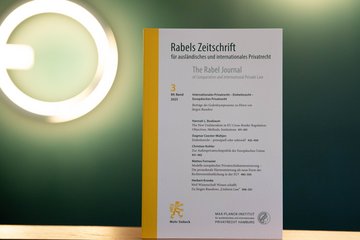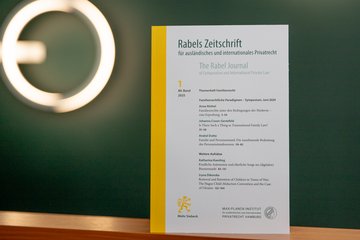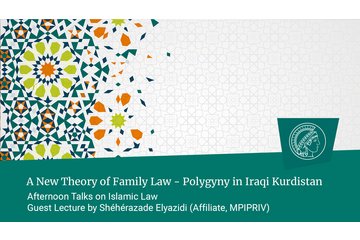
Early marriage in the constitutional spotlight
Early marriage, a phenomenon both global and ancient, has over recent years been the subject of increased focus in human rights and legislative reform. In 2017, the Law to Combat Child Marriage came into force in Germany, preventing minors in Germany from entering into a marriage and rendering without effect marriages concluded by minors abroad. This law is now being subject to constitutional scrutiny. A team of academics led by Nadjma Yassari and Ralf Michaels has authored a comparative assessment for the Federal Constitutional Court (BVerfG) that examines the phenomenon of early marriage in the context of various legal systems and cultures.
The Law to Combat Child Marriage stipulates that marriages concluded abroad are ineffective or deemed null in Germany if at least one spouse was below sixteen years old at the time of the marriage. With this law, the German legislature aimed primarily to protect girls and young women from the consequences of a premature marriage.
The case which the legislature addressed – and which now also faces the German Constitutional Court (BverfG) – concerns a refugee Syrian couple who came to Germany in 2015. At the time of the marriage in Syria, the man was 21 and the woman 14 years old [more information]. After lower courts had held the marriage to be effective under existing law, the legislature tightened this law such that recognition of the marriage would be precluded. The Federal Court of Justice (BGH), instead of applying this new law, referred to the BVerfG for determination whether the new legal provisions combating child marriages were constitutional. The decision of the BVerfG is still pending.
“Early marriages are entered into for a variety of reasons. The spouses often hope to obtain social and material security. For such individuals, Germany’s non-recognition of their marriage can have serious consequences,” says Nadjma Yassari. She heads a research group on the laws of Islamic countries that has for many years been examining the topic of early marriage. If a marriage effectively concluded abroad is not effective in Germany, the affected parties lose marital property rights and their social status is injured. Yassari explains that the law will ultimately often harm precisely those individuals whom it sought to protect. Thus, even if the intention of the German legislature may have been good, the chosen means appear unlikely to produce the desired results.
PIL requires a cultural context

„Reconciling different legal cultures is one of the challenges of living together in a world shaped by globalization.“
– Ralf Michaels –
The Institute’s expert opinion paper examines, in particular, the question of whether some foreign marriages that do not comply with the requirements of German law are nevertheless worthy of protection. The authors show how different value judgments about marriage and family, as well as the role of minors and the sexes, shape the practice of early marriage. In many countries and cultures, only the status of being married enables sexual contact. Marriage allows one to assume recognized position in society that cannot otherwise be achieved simply by attaining a certain age or by completing an education. The non-recognition of a marriage that has already been concluded withholds this status from exactly those minors who are being deemed in need of protection.
"Reconciling different legal cultures is one of the challenges of living together in a world shaped by globalization," says Institute director Ralf Michaels. “Germany cannot act as the world’s legislature. If we declare as ineffective marriages that have been concluded under foreign law and lived in good faith – without examining the individual facts– then we are making a blanket invalidation of a status guaranteed by another legal system. This is precisely not the task of private international law."
A global survey with nuanced perspective
„The laws of all legal systems aim to protect people. This principle is interpreted and implemented in a variety of ways. This diversity must be taken into account when assessing whether an early marriage is worthy of protection.“
– Nadjma Yassari –
In its opinion, the Institute draws on its core competencies in comparative law and private international law. To provide the necessary knowledge on the constitutional issue of recognition, an ad hoc team of 30 scholars examined the legal and practical treatment of early marriage in around 60 legal systems worldwide. In addition to many Muslim jurisdictions, the survey includes European countries inside and outside the EU, the USA, Japan and various countries in Latin America.
Entering into a marriage presupposes capacity to marry. Its legal regulation reflects the judgments of legislatures as to the point in time when people have the necessary physical and mental maturity to foresee – and accept – the consequences of a marriage. In some legal systems, this point in time is generally prescribed and pegged to fixed age limits. In other countries, it is determined on the basis of variable criteria, such as physical or mental maturity or the best interests of the child. Often, authorities have a margin of discretion in individual cases when determining the capacity to marry. “The laws of all legal systems aim to protect people. This principle is interpreted and implemented in a variety of ways. This diversity must be taken into account when assessing whether an early marriage is worthy of protection,” says Nadjma Yassari, summarizing one of the central results of the study.
Critical summary
The international comparison shows that the German legislation is unusually strict and may lead to exceptional hardship in individual cases. “The Law to Combat Child Marriage does not allow any leeway for the assessment of individual circumstances, nor does it permit married couples to assert their position within the framework of a formal legal process,” says Ralf Michaels. “This is harsher even than in many other European legal systems.”
The prohibition of early marriage may well prevent the celebration of marriages by minors in Germany (which, however, had already been rare), but there is no evidence that the non-recognition of such marriages by the German state will lead to their being concluded less frequently abroad. A deterrent effect cannot therefore be expected.
The authors of the expert report point out that private international law usually protects the legitimate expectations that come from an effective status. Withholding legal effect from marriages otherwise effectively concluded abroad can represent an assault on the constitutional protection of marriage and the family – as it must be recalled that, according to the Basic Law, this protection is available to all people regardless of origin and age.
Bibliography
The following articles of the volume are available in Open Access on SSRN in the series "Max Planck Private Law Research Paper Series":
Public international law and European law requirements
Antonia Sommerfeld: Völkerrechtliche Anforderungen an die Frühehe (Public International Law Requirements in Relation to Early Marriage)
https://ssrn.com/abstract=3744132
Raphael de Barros Fritz: Art. 13 Abs. 3 Nr. 1 EGBGB aus der Perspektive des Europarechts (Art. 13 Para. 3 No. 1 of the Introductory Act to the German Civil Code (EGBGB) from the Perspective of European Law)
https://ssrn.com/abstract=3744108
Requirements of German constitutional law
Dieter Martiny: Die ausländische Frühehe und der Schutz der Ehe nach Art. 6 Abs. 1 GG (Foreign Early Marriage and the Protection of Marriage under Art. 6 Para 1 of the German Basic Law)
https://ssrn.com/abstract=3744106
Christoph Schoppe: Art. 13 Abs. 3 Nr. 1 EGBGB und die kindesspezifischen Gewährleistungen der Verfassung: Frühehe, Kindeswohl und Persönlichkeitsentwicklung (Art. 13 Para. 3 No. 1 of the Introductory Act to the German Civil Code (EGBGB) and Child-specific Constitutional Guarantees: Early Marriage, the Best Interests of the Child and Personal Development)
https://ssrn.com/abstract=3744113
Christine Toman und Jakob Olbing: Die ausländische Frühehe vor dem allgemeinen Gleichheitssatz (Foreign Early Marriage in Relation to the Principle of Equal Treatment)
https://ssrn.com/abstract=3744110
Samuel Zeh: Die ausländische Frühehe und das Rückwirkungsverbot (Foreign Early Marriage and the Principle of Non-retroactivity)
https://ssrn.com/abstract=3744119












